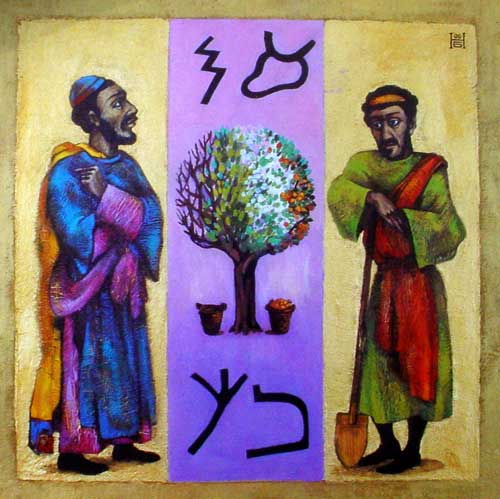


"The Unfruitful Fig Tree and the Servants Duty" by Kazakhstan Artist Nelly Bube.



Is there a logical sequence among the subparagraphs in verses 1-10? The writer of these notes assumes that there is logical sequence. The items are not merely picked or chosen by Luke from some outside source.
Chapters 15:1 to 17:10 form a larger section. In 15 Jesus spoke the three parables in answer to the Pharisees and Scribes who were grumbling. At 16:1 Jesus addresses the disciples. At 16:14 the Pharisees despise Jesus and He again speaks to them. In 17:1 Jesus addresses "the disciples," obviously more than the Twelve because in verse 5 He addresses the Apostles in particular. Jesus alternately addresses His friends and His enemies. In our text headdresses His friends.
As noted above, "disciples" likely means more than the Twelve. Things happen because of the fallen estate of human beings and the work of Satan. "Offenses" in Biblical language mean those attitudes and actions of people which kill faith in other people. Some translate: "temptations to sin," or "things that make people fall into sin."
"Things" originally meant the little stick in an animal-trap to which the bait was attached. When the stick was disturbed, the animal was trapped. The application is clear. The point is that the one who causes the things is wholly responsible, in fact is condemned. For the meaning compare the beatitudes at 6:20-23 with the woes at 6:24-26.
Arndt: Soul-murder will be committed. It should be noted that at no point is the language of our Lord more severe than when He speaks of this sad subject.
Why did Jesus say this at this point? Because from 15:1 to 16:31 the Pharisees and Scribes, who were self-righteous, avaricious, an abomination in Jesus' estimation and were despising Moses and the prophets, were scandalous in their attitude to these immature Christians whom Jesus was addressing.
But it is plain from verses 2-4 that Jesus warns Christians too about not being scandalous toward other Christians.
Stoeckhardt: The Christians are to take heed that they do not sin against each other, because in the fellowship of Christians there is sinning also.
"It would be better" means "it is profitable." It is translated "it were better," or "it would be better." But the text is present indicative, not subjunctive or potential indicative.
The upper millstone had a hole in the center. Jesus envisages a case in which a rope was put through this hole and the stone tied about the offender's neck. To be drowned in the sea with a millstone allows no escape from physical death. But, says Jesus, that's better than to scandalize a Christian, to cause the latter's spiritual death.
"Little ones" contains the idea "of these little ones . . . just one." This includes children and the immature in the faith.
Failure to call people's sins to their attention, as well as failure to forgive when they repent, are very scandalous and can cause the spiritual death of a fellow-Christian. Jesus speaks only of a rebuke which ends in acknowledgement of sin.
"If he repents" is "if he is sorry." Here "repent" is used in the narrow sense, denoting contrition. If the rebuked person registers no contrition, Jesus is implying that he not be forgiven. We need remind all Christians of their duty and power to forgive the sins of penitent sinners. To withhold forgiveness from a penitent sinner means to close heaven to that person. Consider: The Office of the Keys, the very life-blood of the Church.
"Furthermore." "Sin" in verse 3 was sin in general, whether against God, you, or anybody else. But here it's "against you."
"Comes back" means "turns to you saying." This shows the stricken conscience. Lenski thinks that the seven sins are all different from each other. But the text doesn't say that. It is highly unlikely, of course, that one would commit the same sin seven times against another in one day, but that is not the real point. The point is that contrition and absolution should have no limit.
"I repent" cannot mean "I changed my mind." That would be an insult. Better would be "I'm sorry." That is precisely what Jesus means. That's real contrition.
Following this "you must forgive." On no occasion, no matter how often, dare we withhold forgiveness from a contrite sinner.
If there is a logical connection here with the previous, the Greek word "and," not translated in the NIV, means "and at that point."
The apostles are called "apostles" here to distinguish them from the people mentioned in verse 1. The Twelve address Him. All our translations read the three following words as "increase our faith" or its equivalent, which excludes the idea of their asking for a charismatic faith to perform exceptional things. We thinks that's right. They make the request simply because they have failed to do consistently what Jesus said in verses 3-4 and perhaps also 1-2. And who is not guilty?
Here we have a mixed condition. The protasis is that of a fact or particular condition. The apodosis is that of a contrary-to-fact condition, and there is a second apodosis. Furthermore, what kind of tree is meant? We list the translations on these several points.
AV: If ye had faith . . . ye might say . . . sycamine . . . it should obey.
RSV: If ye had faith . . . you could say . . . sycamine . . . it would obey.
TEV, NEB: If ye had faith . . . you could say . . . mulberry . . . it would obey.
AAT: If you have faith . . . you could say . . . mulberry . . . would obey.
NASB: If you had faith . . . you would say . . . mulberry . . . it would obey.
The translations which render the protasis as contrary-to-fact ("had faith") perhaps treat this as charismatic faith, and those which render it as fact ("have faith") perhaps treat this as ordinary saving faith. Why NIV renders the second apodosis as "it will obey" we do not know. We offer our own translation: "If you have faith as a mustard seed, you would say to this sycamine tree 'Be uprooted and be planted in the sea' and it would obey you."
With the fact condition protasis, Jesus is not denying that they have faith but means for them to examine themselves. "As a mustard seed" means "though small as a mustard seed but nevertheless genuine." The genuineness is the point of comparison.
Morris: It is not so much great faith in God that is required as faith in a great God.
Stoeckhardt: They must learn that faith exists only by the power of God, seizing the almighty power and therefore a little faith, if it is only the right kind, will perform seemingly impossible miracles.
Arndt: It asserts that the power of faith is as unlimited as God's power itself.
Though they had faith, they were not genuinely trusting the promises of God.
We leave unanswered the question of what kind of tree Jesus speaks about. In the final analysis it will make little difference. What is amazing is the command: "Be uprooted and be planted in the sea." Note that the verbs are passive. God is the agent. What is commanded is unheard of and contrary to nature, especially to be planted at the bottom of the sea and to flourish as if it were growing on land. This is the genuine faith necessary to do what Jesus states in verses 1-4. There may be times when we have been a scandal to one of these little ones. There surely were times when we did not rebuke or forgive fellow-sinners as we ought to have. We need genuine faith.
Verses 7, 8, and 9 are each a rhetorical question. Anyone can answer each question. To the first: "No one would do that." To the second: "Yes he will say." To the third: "He will not thank him." Lenski thinks that the idea of the slave plowing or shepherding is prophetic of the work of the Apostles. That is too subtle, we think. The point of verse 7 is that the slave has no will of his own. After a hard day's work he must still first obey his master willingly at time of evening meal, without question.
The verse begins with "on the contrary" and expects the answer "yes."
Luke 17:9 Would he thank the servant because he did what he was told to do?
The subject is the owner of the slave. He neither owes nor gives the slave any thanks for doing what he has been ordered to do. By the way, the illustration in verses 7-10 does not picture what kind of God we have but what kind of servants God wants. That is the sole point which becomes clear in verse 10.
This verse draws the point of comparison, just as in 14:33. Now comes a present general condition: "Whenever do you anything you've been commanded to do, always say, etc." It is a constant principle in the life of the Christians.
"Unworthy" means "who claim no credit," or "who deserve no credit." It does not mean "useless." It means that the master owes them nothing, not even thanks, though they've done all they were told. Some of the translations add the word "only." "We have only done what we ought to do." That is the intended sense.
Why did Jesus add verses 7-10? It is the same principle as enunciated in Luke 10:20. When Christians, by faith, do that which is impossible without faith, the devil gets into it and the Christian is in danger of boasting or even of speaking as did the Pharisee in Luke 18:12, as if God owed him something for what he is or does. But that is dangerous to the principle of grace and unmerited favor of God in Christ. Jesus is warning His Apostles. When they do exercise genuine faith, verse 6, let them be on guard lest they lay claim to merit on their own or require gratitude from God. In verse 10 Jesus draws an ideal picture of people who do everything commanded them. Even if we could do that, which we don't, we could lay no claim to God's gratitude toward us.
As said above, the illustration pictures the proper attitude of the Christian, not what God is like. The Bible does not picture Him as a stern, feelingless master. Quite the contrary. Read Mark 10:45; Luke 12:37; and Mark 9:41. Jesus came to serve me. He will serve me in heaven. He will reward my most insignificant deeds. That is the kind of God He is. But when or if I think or feel that He owes me thanks for what I've done, I have the wrong attitude. It is sin. It does not proceed from genuine faith.